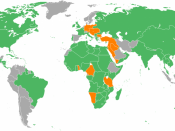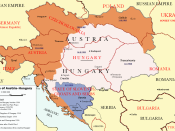World War One, 1914-1918, also called the Great War, entangled most of the world?s great powers. On one side was the Entente, (chiefly France, Britain, Russia, and the U.S.); on the other were the Central Powers (Germany, Austria-Hungary, and Turkey). Prominent among the war?s causes were the imperialist, territorial, and economic rivalries of the great powers. The German empire in particular was determined to establish itself as the preeminent power on the continent. The Germans were also intent on challenging the naval superiority of Britain. However it was rampant nationalism-especially evident in the Austro-Hungarian empire-that furnished the immediate cause of hostilities.
The posture a country?s government takes when confronted with decisions concerning the population?s welfare is, in general, dictated by the attitudes of the people. When facing war the idea of involving the country must be put across in such a way that the people are made to feel it is necessary.
Such was the case in Europe before World War 1.
In 1914 there was a feeling of tension regarding invasion scares related to the naval rivalry between Germany and Britain, French concerns of a possible new invasion from Germany, and Austria-Hungary having trouble with Serbia. Governments were beginning to mobilize their forces, which lead to a fear and talk of the inevitability of war. Patriotism grew by leaps and bounds fed by the idea that war could solve social and political woes. The language used by politicians and media to discuss international relations also reinforced patriotism. The curriculum in French schools over years, which was typical of most countries, included books that included such terminology as,? War is not probable, but possible. It is for that reason that France remains armed and always ready to defend itself? In defending France we are defending the land where we...


